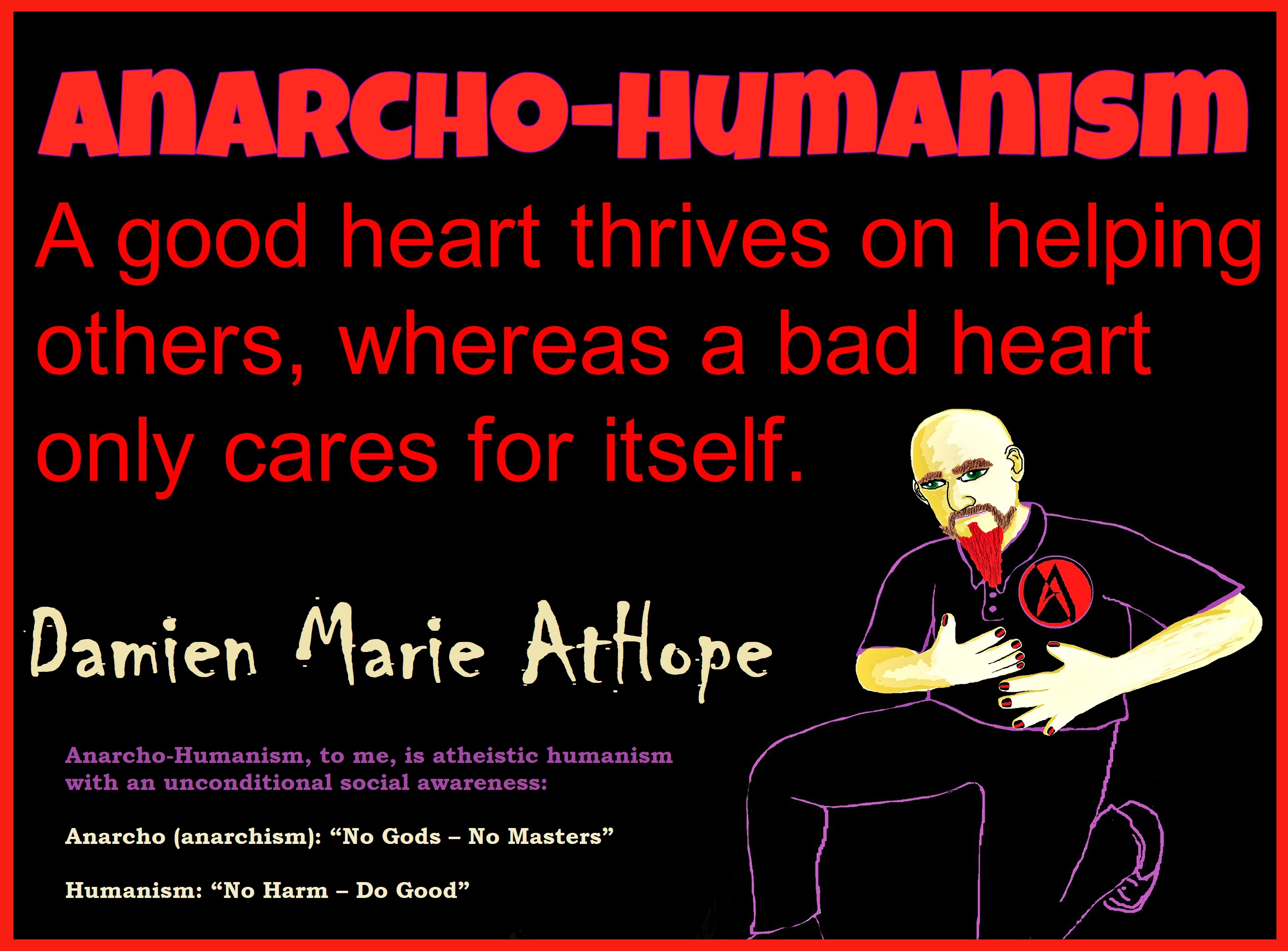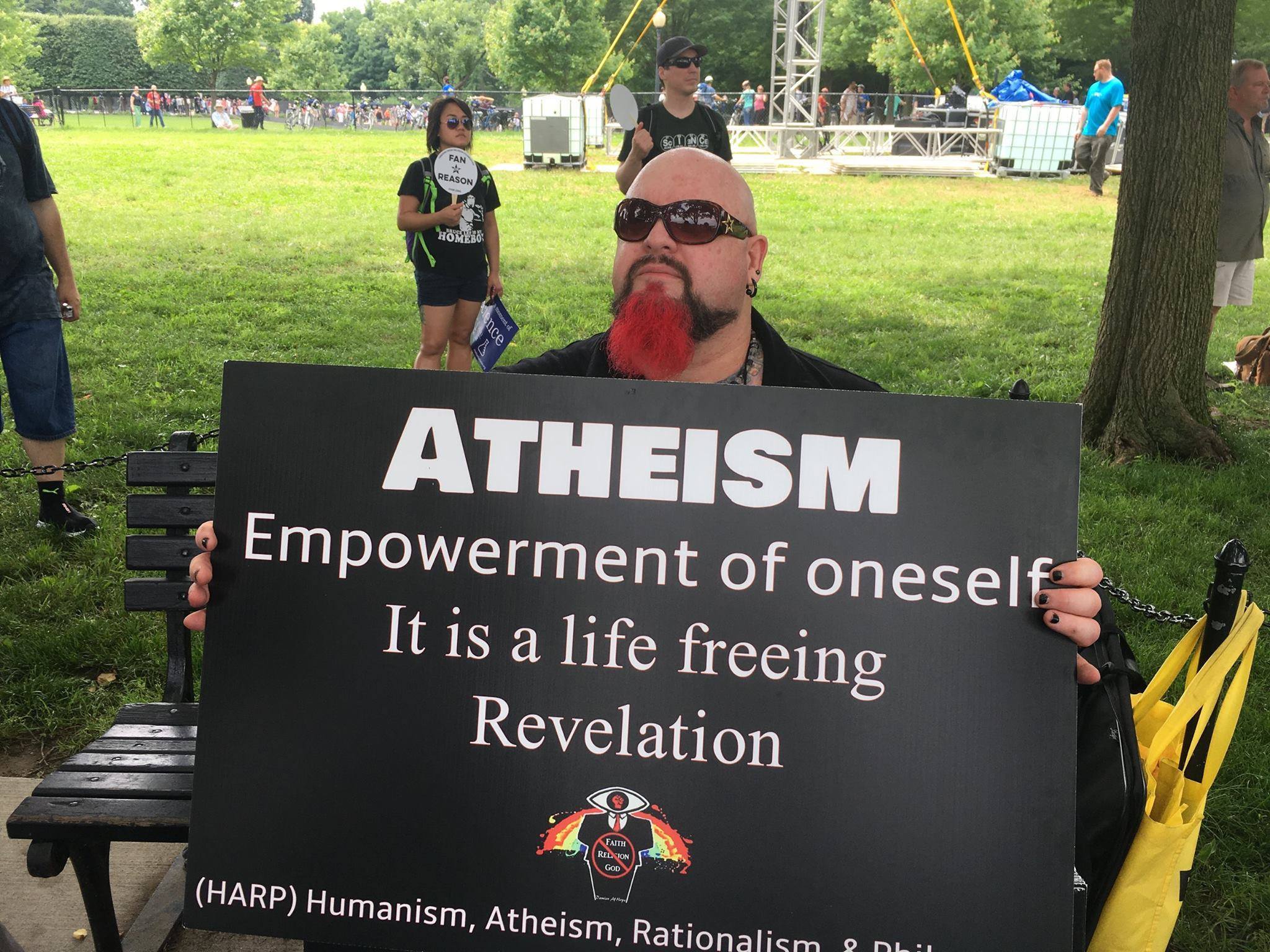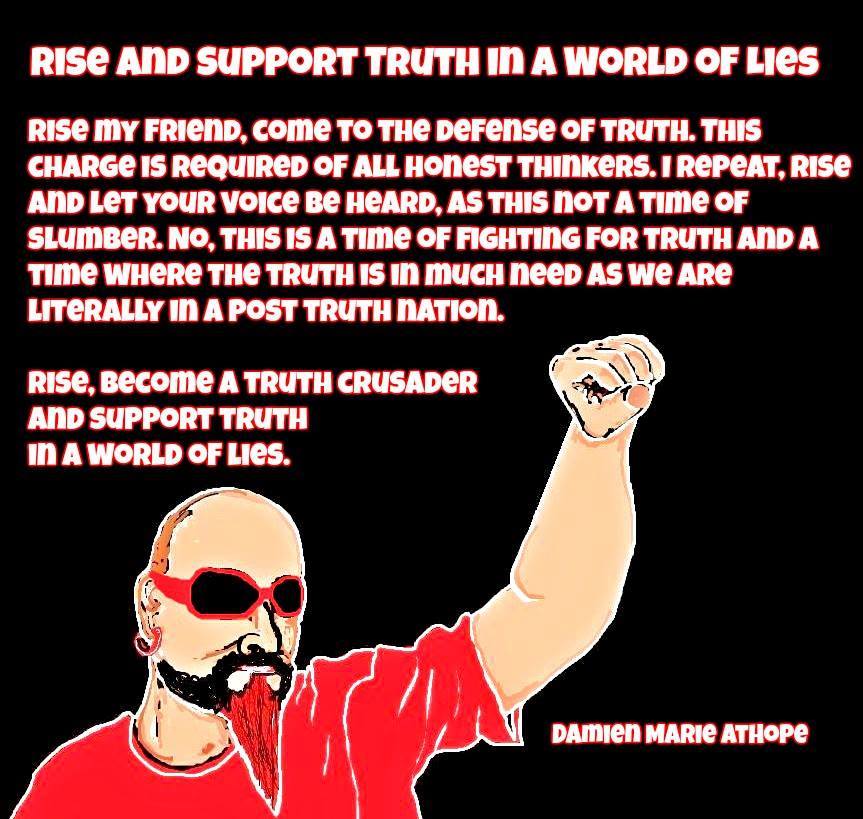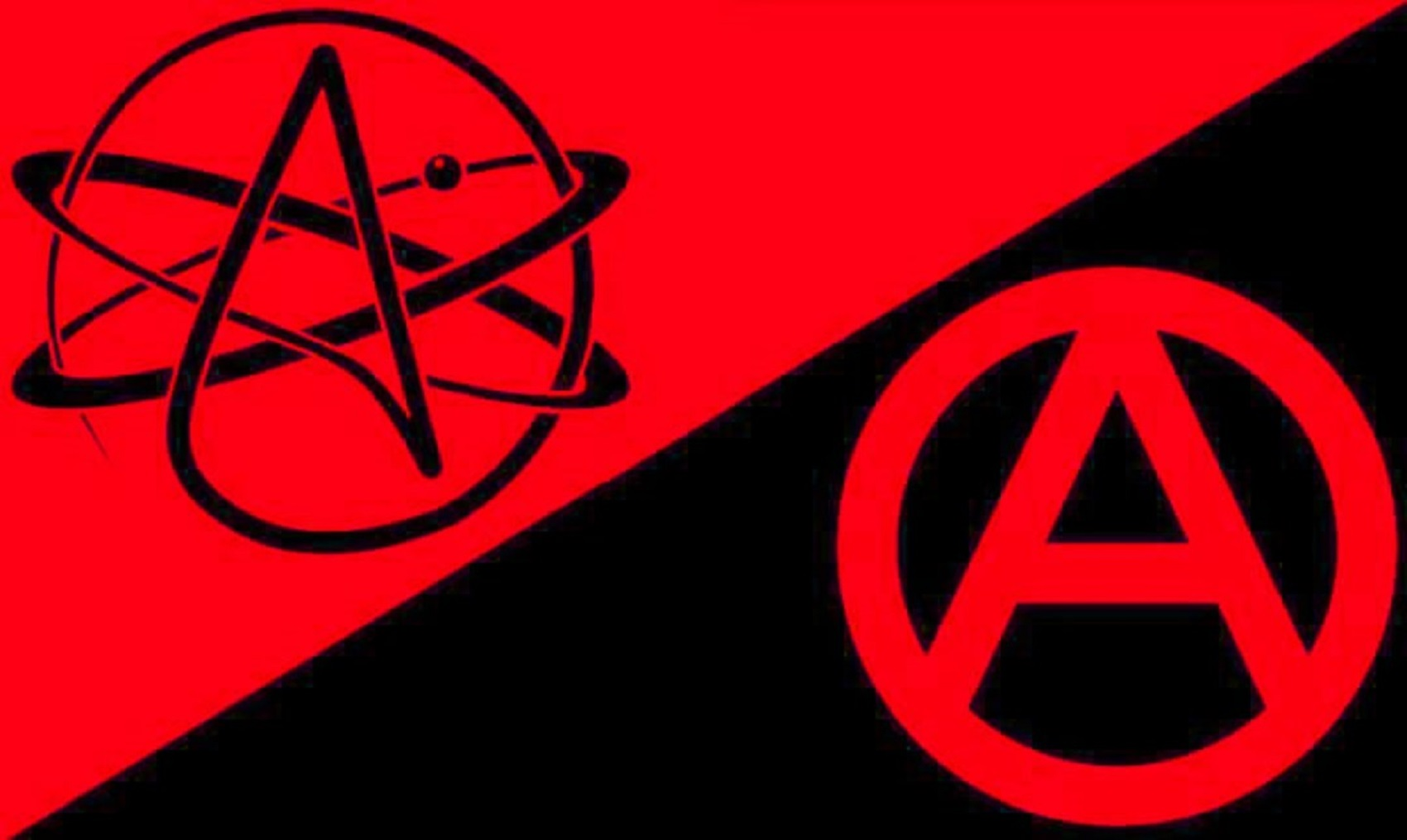
Anarchy atheism: advocate of freethought and anti-religious activism. If you don’t believe any god should control you, you shouldn’t believe any other human being should believe in a sky king or supernatural master and more than human kings or masters. An anarchist would most likely be atheist, anti-theist, agnostic or apatheist believing there should be no rulers thus reject god whether they think one does or doesn’t exist. Certainly excludes rulers like gods, kings, or the state. Anarchy atheism likewise could be anti-religion as well seeing parallels between organized religion external control instead of the individual (even if god was removed) and the state (the primary target of most anarchists) are striking thus rejected. Politicians and preachers are one and the same: both work for a higher power than you, money and power. Ultimately, anarchy to atheism, goes past a simple atheism tendency to only attack god, while ignoring the state, capital, and other possible forms of domination, when anarchy atheists believe they have to attack all of it.
“No gods, no masters” is an anarchist, feminist and labor slogan. No gods, no masters comes from a pamphlet handed out by the Industrial Workers of the World during the 1912 Lawrence Textile Strike. The phrase is derived from the French slogan “Ni dieu ni maître!” (literally ‘Neither God nor master’) coined by the socialist Auguste Blanqui in 1880. First feminist usage was in 1914, Margaret Sanger launched The Woman Rebel, an eight-page monthly newsletter which promoted contraception using the slogan “No Gods, No Masters”. Margaret Sanger insisted that every woman was the mistress of her own body. ”Women without superstition: No gods – No Masters!” by Annie Laurie Gaylor is a collection of writings by women freethinkers during the 19th and 20th century. Today the slogan continues to find use in anarchist politics. An anthology of anarchist writing was collected under the title “No Gods, No Masters: An Anthology of Anarchism”
Anarchism is a political philosophy that advocates self-governed societies based on voluntary institutions. These are often described as stateless societies, although several authors have defined them more specifically as institutions based on non-hierarchical free associations. Anarchism holds the state to be undesirable, unnecessary, and harmful. While anti-statism is central, anarchism entails opposing authority or hierarchical organization in the conduct of all human relations, including, but not limited to, the state system. Anarchism does not offer a fixed body of doctrine from a single particular worldview, instead of luxing and flowing as a philosophy. Many types and traditions of anarchism exist, not all of which are mutually exclusive. Anarchist schools of thought can differ fundamentally, supporting anything from extreme individualism to complete collectivism. Strains of anarchism have often been divided into the categories of social and individualist anarchism or similar dual classifications. Anarchism is usually considered a radical left-wing ideology, and much of anarchist economics and anarchist legal philosophy reflects anti-authoritarian interpretations of communism, collectivism, syndicalism, mutualism, or participatory economics.
I am an anarcho-humanist (basically a socialist-collectivist-mutualist-anarchist as well as rather liberal, progressive, and revolutionary, I want all positive change)
You keep attacking activists and while you’re doing that, other activists and I will keep fighting for change. Sadly, you may change a few people where they lose their way in the momentum of activism. However, happily, while you’re doing that, other activists and I will help positively change the world. I hate when someone states anarchism is about not wanting to pay taxes, as if they don’t know the main persuasion of true anarchism is humanity not selfishness of self only concern as in “i” language instead of “we” language of true anarchism is socialist anarchism that wishes to add us all in liberation of humanity from oppressors, as much as possible. With a general rationale of compassion and comradery with our fellow humans, who we know are all our fellow humans, sisters, brothers, and others are all equal beings of dignity in one human family.
My anarchism is because of my care for humanity. I will leave selfishness for the capitalists where it belongs. I do not support sucker punching people, even Nazis. To me, violence should be for self-defense or other-defense. I only hit those that try to hit me or others around me, I am for non-aggression.
What Inspires My Anarcho-Humanism:
- We are all one connected human family.
- No one owns the earth.
- If you can’t trust people with freedom how can you trust them with power?
What inspires my anarcho-humanism has three core truths to my ethical anarchist persuasion:
1. We are all one connected human family, proven by DNA showing we should treat each other as fellow dignity beings, supported equally (no gods and no masters = “Anarcho”).
2. No one owns the earth, we may make claims to it even draw lines on maps thinking this makes the fantasy borders, illusion supported by force and the potential for threat. Thus the ethical truth is we need to share the earth as communally as possible. And use the resources as safe and ethically as possible striving towards sharing and caring. (do no Harm and do good = Humanism)
3. If you can’t trust people with freedom how can you trust them with power? Government is only as good as what they provide but I don’t trust ones that have rights over my body. How much more of a violation do you need to show their harm? I am not anti-society, I value good governance just don’t need the extra dead weight of government. There is not one thing a government is valued for that a non-government group with the same financial support and resources could not also do. I get we rise by helping each other and supporting universal betterment and human flourishing. Helping is Helpful: Valuing, Motivating, Supporting humanity is limited by nationalism and the, us Vs them, as if you should feel connected to only a few humans just because people invented the mental concept of land ownership, you mean you assert that you will harm others for an amount of the earth’s surface. Seeing with anarcho-humanism eyes helps you see how to Grow in Our Positive Outcomes: Gratitude, Empathy, and Kindness. We can become a more quality person by actively being aware and developing a gratitude for life, which supports as well as grows our feelings of empathy, that then motivates the behavior of kindness. And kindness flourishes in openness and freedom. (No gods no masters as well as do no harm and do good = Anarcho-humanism)
Lastly, I Am an Atheist-Humanist who is a Socialist, Collectivist, Mutualist, Anarchist: (Anarcho-Humanist) But Why do I Hate Religion? Religion and gods are an attack to self-freedom and self-mastery. I was asked why I openly and publicly am so passionate in my hate of religion. further asking what specifically in your life contributed to this outcome. I hate harm, oppression, bigotry, and love equality, self-ownership, self-empowerment, self-actualization, and self-mastery, as well as truth and not only does religion lie, it is a conspiracy theory of reality. Moreover, not only is religion a conspiracy theories of reality, it is a proud supporter of pseudohistory and or pseudoscience they also push pseudomorality. Religion on the whole to me deserves and earns hate, or at least disfavor when you really analyze it. Not to mention the corruption it has on politics or laws. As well as how destructive this unworthy political influence has and creates because of these false beliefs and the harm to the life of free adults but to the lives of innocent children as well (often robbed of the right to choose and must suffer indoctrination) as the disruption of educated even in public schools. Etc… I as others do have the right to voice our beliefs, just as I or others then have the right to challenge voiced beliefs. Religions and their god myths are a direct threat to Self-ownership and thus Human Rights. Long live mental freedom… 1, 2, 3
- Anarchy Atheism
- I am a “Real Anarchist” not an “Anarcho-Capitalist”
- Atheist Anarchists Discussion
- Interview with Anarchist and Firebrand Atheist Courtney Connatser
- My Atheistic (socialist-anarchist) Humanism?
- Anarcho-Humanism
- What Inspires My Anarcho-Humanism?
- I am an Axiological Atheist, with a Rationalist Persuasion, who Supports Anarcho-Humanism
- I am an Anarchist and Strive to Fight Injustice
- Feminist atheists as far back as the 1800s?
- Defending my Antireligious Firebrand Atheist Activism
- Self-ownership, Human Rights, and Societal Liberty or Freedoms
- Self-ownership/Body-ownership: Sexual Consent, Abortion, Genital Mutilation, Prostitution, Drugs, and the Right to Die
- The Need for Consent and the value of Body Ownership: Healthy Sex Talk with Kids
- “No gODs, No Masters”
- A Little On MY Revolutionary Politics
- Atheism creates Individualism?
- Atheistic Humanism?
- Don’t be Boxed in by Abstraction
Why are most anarchists atheists?
It is a fact that most anarchists are atheists. They reject the idea of god and oppose all forms of religion, particularly organized religion. So why do so many anarchists embrace atheism? The simplest answer is that most anarchists are atheists because it is a logical extension of anarchist ideas. If anarchism is the rejection of illegitimate authorities, then it follows that it is the rejection of the so-called Ultimate Authority, God. Anarchism is grounded in reason, logic, and scientific thinking, not religious thinking. Anarchists tend to be rationalists and/or skeptics, and not believers. Most anarchists consider the Church to be steeped in hypocrisy and the Bible a work of fiction, riddled with contradictions, absurdities, and horrors. It is notorious in its debasement of women and its sexism is infamous. Yet men are treated little better. Nowhere in the bible is there an acknowledgment that human beings have inherent rights to life, liberty, happiness, dignity, fairness, or self-government. In the bible, humans are sinners, worms, and slaves (figuratively and literally, as it condones slavery). God has all the rights, humanity is nothing. – An Anarchist FAQ – Medium
This is unsurprisingly, given the nature of religion. Bakunin put it best:
“The idea of God implies the abdication of human reason and justice; it is the most decisive negation of human liberty, and necessarily ends in the enslavement of mankind, both in theory and in practice.
“Unless, then, we desire the enslavement and degradation of mankind . . . we may not, must not make the slightest concession either to the God of theology or to the God of metaphysics. He who, in this mystical alphabet, begins with A will inevitably end with Z; he who desires to worship God must harbor no childish illusions about the matter, but bravely renounce his liberty and humanity.– An Anarchist FAQ – Medium
“If God is, man is a slave; now, man can and must be free; then, God does not exist.” [God and the State, p. 25]– An Anarchist FAQ – Medium
For most anarchists, then, atheism is required due to the nature of religion. “To proclaim as divine all that is grand, just, noble, and beautiful in humanity,”Bakunin argued, “is to tacitly admit that humanity of itself would have been unable to produce it — that is, that, abandoned to itself, its own nature is miserable, iniquitous, base, and ugly. Thus we come back to the essence of all religion — in other words, to the disparagement of humanity for the greater glory of divinity.” As such, to do justice to our humanity and the potential it has, anarchists argue that we must do without the harmful myth of god and all it entails and so on behalf of “human liberty, dignity, and prosperity, we believe it our duty to recover from heaven the goods which it has stolen and returned them to earth.” [Op. Cit., p. 37 and p. 36]– An Anarchist FAQ – Medium
As well as the theoretical degrading of humanity and its liberty, religion has other, more practical, problems with it from an anarchist point of view. Firstly, religions have been a source of inequality and oppression. Christianity (like Islam), for example, has always been a force for repression whenever it holds any political or social sway (believing you have a direct line to god is a sure way of creating an authoritarian society). The Church has been a force of social repression, genocide, and the justification for every tyrant for nearly two millennia. When given the chance it has ruled as cruelly as any monarch or dictator. This is unsurprising:
“God being everything, the real world and man are nothing. God being truth, justice, goodness, beauty, power and life, man is falsehood, iniquity, evil, ugliness, impotence, and death. God being master, man is the slave. Incapable of finding justice, truth, and eternal life by his own effort, he can attain them only through a divine revelation. But whoever says revelation, says revealers, messiahs, prophets, priests, and legislators inspired by God himself; and these, as the holy instructors of humanity, chosen by God himself to direct it in the path of salvation, necessarily exercise absolute power. All men owe them passive and unlimited obedience; for against the divine reason there is no human reason, and against the justice of God no terrestrial justice holds.” [Bakunin, Op. Cit., p. 24]– An Anarchist FAQ – Medium
Christianity has only turned tolerant and peace-loving when it is powerless and even then it has continued its role as apologist for the powerful. This is the second reason why anarchists oppose the church for when not being the source of oppression, the church has justified it and ensured its continuation. It has kept the working class in bondage for generations by sanctioning the rule of earthly authorities and teaching working people that it is wrong to fight against those same authorities. Earthly rulers received their legitimisation from the heavenly lord, whether political (claiming that rulers are in power due to god’s will) or economic (the rich having been rewarded by god). The bible praises obedience, raising it to a great virtue. More recent innovations like the Protestant work ethic also contribute to the subjugation of working people. That religion is used to further the interests of the powerful can quickly be seen from most of history. It conditions the oppressed to humbly accept their place in life by urging the oppressed to be meek and await their reward in heaven. As Emma Goldman argued, Christianity (like religion in general) “contains nothing dangerous to the regime of authority and wealth; it stands for self-denial and self-abnegation, for penance and regret, and is absolutely inert in the face of every [in]dignity, every outrage imposed upon mankind.” [Red Emma Speaks, p. 234]– An Anarchist FAQ – Medium
Thirdly, religion has always been a conservative force in society. This is unsurprising, as it bases itself not on investigation and analysis of the real world but rather in repeating the truths handed down from above and contained in a few holy books. Theism is then “the theory of speculation” while atheism is “the science of demonstration.” The “one hangs in the metaphysical clouds of the Beyond, while the other has its roots firmly in the soil. It is the earth, not heaven, which man must rescue if he is truly to be saved.” Atheism, then, “expresses the expansion and growth of the human mind” while theism “is static and fixed.” It is “the absolutism of theism, its pernicious influence upon humanity, its paralysing effect upon thought and action, which Atheism is fighting with all its power.” [Emma Goldman, Op. Cit., p. 243, p. 245 and pp. 246–7]– An Anarchist FAQ – Medium
As the Bible says, “By their fruits shall ye know them.” We anarchists agree but unlike the church we apply this truth to religion as well. That is why we are, in the main, atheists. We recognise the destructive role played by the Church, and the harmful effects of organised monotheism, particularly Christianity, on people. As Goldman summaries, religion “is the conspiracy of ignorance against reason, of darkness against light, of submission and slavery against independence and freedom; of the denial of strength and beauty, against the affirmation of the joy and glory of life.” [Op. Cit., p. 240]– An Anarchist FAQ – Medium
So, given the fruits of the Church, anarchists argue that it is time to uproot it and plant new trees, the trees of reason and liberty. That said, anarchists do not deny that religions contain important ethical ideas or truths. Moreover, religions can be the base for strong and loving communities and groups. They can offer a sanctuary from the alienation and oppression of everyday life and offer a guide to action in a world where everything is for sale. Many aspects of, say, Jesus’ or Buddha’s life and teachings are inspiring and worth following. If this were not the case, if religions were simply a tool of the powerful, they would have long ago been rejected. Rather, they have a dual-nature in that contain both ideas necessary to live a good life as well as apologetics for power. If they did not, the oppressed would not believe and the powerful would suppress them as dangerous heresies. And, indeed, repression has been the fate of any group that has preached a radical message. In the middle ages numerous revolutionary Christian movements and sects were crushed by the earthly powers that be with the firm support of the mainstream church. During the Spanish Civil War the Catholic church supported Franco’s fascists, denouncing the killing of pro-Franco priests by supporters of the republic while remaining silent about Franco’s murder of Basque priests who had supported the democratically elected government (Pope John Paul II is seeking to turn the dead pro-Franco priests into saints while the pro-Republican priests remain unmentioned).– An Anarchist FAQ – Medium
The Archbishop of El Salvador, Oscar Arnulfo Romero, started out as a conservative but after seeing the way in which the political and economic powers were exploiting the people became their outspoken champion. He was assassinated by right-wing paramilitaries in 1980 because of this, a fate which has befallen many other supporters of liberation theology, a radical interpretation of the Gospels which tries to reconcile socialist ideas and Christian social thinking. Nor does the anarchist case against religion imply that religious people do not take part in social struggles to improve society. Far from it. Religious people, including members of the church hierarchy, played a key role in the US civil rights movement of the 1960s. The religious belief within Zapata’s army of peasants during the Mexican revolution did not stop anarchists taking part in it (indeed, it had already been heavily influenced by the ideas of anarchist militant Ricardo Flores Magon). It is the dual-nature of religion which explains why many popular movements and revolts (particularly by peasants) have used the rhetoric of religion, seeking to keep the good aspects of their faith will fighting the earthly injustice its official representatives sanctify. For anarchists, it is the willingness to fight against injustice which counts, not whether someone believes in god or not. We just think that the social role of religion is to dampen down a revolt, not encourage it.– An Anarchist FAQ – Medium
The tiny number of radical priests compared to those in the mainstream or on the right suggests the validity of our analysis. It should be stressed that anarchists, while overwhelmingly hostile to the idea of the Church and an established religion, do not object to people practising religious belief on their own or in groups, so long as that practice doesn’t impinge on the liberties of others. For example, a cult that required human sacrifice or slavery would be antithetical to anarchist ideas, and would be opposed. But peaceful systems of belief could exist in harmony within in anarchist society. The anarchist view is that religion is a personal matter, above all else — if people want to believe in something, that’s their business, and nobody else’s as long as they do not impose those ideas on others. All we can do is discuss their ideas and try and convince them of their errors. To end, it should be noted that we are not suggesting that atheism is somehow mandatory for an anarchist. Far from it. As we discuss in section A.3.7, there are anarchists who do believe in god or some form of religion. For example, Tolstoy combined libertarian ideas with a devout Christian belief. His ideas, along with Proudhon’s, influences the Catholic Worker organisation, founded by anarchists Dorothy Day and Peter Maurin in 1933 and still active today. The anarchist activist Starhawk, active in the current anti-globalization movement, has no problems also being a leading Pagan. However, for most anarchists, their ideas lead them logically to atheism for, as Emma Goldman put it, “in its negation of gods is at the same time the strongest affirmation of man, and through man, the eternal yea to life, purpose, and beauty.” [Red Emma Speaks, p. 248] – An Anarchist FAQ – Medium
Anarchist clashes with religion
“Anarchists have traditionally been skeptical of or vehemently opposed to organized religion. Nevertheless, some anarchists have provided religious interpretations and approaches to anarchism, including the idea that glorification of the state is a form of sinful idolatry. Anarchists “are generally non-religious and are frequently anti-religious, and the standard anarchist slogan is the phrase coined by a non-anarchist, the socialist Auguste Blanqui in 1880: ‘Ni Dieu ni maître!’ (Neither God nor master!)…The argument for a negative connection is that religion supports politics, the Church supports the State, opponents of political authority also oppose religious authority”. William Godwin, “the author of the Enquiry Concerning Political Justice(1793), the first systematic text of libertarian politics, was a Calvinist minister who began by rejecting Christianity, and passed through deism to atheism and then what was later called agnosticism.” The pioneering German individualist anarchist Max Stirner, “began as a left-Hegelian, post-Feuerbachian atheist, rejecting the ‘spooks’ of religion as well as of politics including the spook of ‘humanity’.” ref
“Pierre-Joseph Proudhon, “the first person to call himself an anarchist, who was well known for saying, ‘Property is theft’, also said, ‘God is evil’ and ‘God is the eternal X’”. Published posthumously in French in 1882, Mikhail Bakunin‘s God and the State was one of the first anarchist treatises on religion. Bakunin expounds his philosophy of religion’s place in history and its relationship to the modern political state. It was later published in English by Mother Earth Publications in 1916. Anarcho-communism‘s main theorist Peter Kropotkin, “was a child of the Enlightenment and the Scientific Revolution, and assumed that religion would be replaced by science and that the Church, as well as the State, would be abolished; he was particularly concerned with the development of a secular system of ethics which replaced supernatural theology with natural biology.” ref
“Errico Malatesta and Carlo Cafiero, “the main founders of the Italian anarchist movement, both came from freethinking families (and Cafiero was involved with the National Secular Society when he visited London during the 1870s)”. In the French anarchist movement Eliseé Reclus was a son of a Calvinist minister, and began by rejecting religion before moving on to anarchism.” ref
“Sebastien Faure, “the most active speaker and writer in the French movement for half a century, “ wrote an essay titled Twelve Proofs of God’s Inexistence. German insurrectionary anarchist Johann Most wrote an article called “The God Pestilence”. In the United States “freethought was a basically anti-christian, anti-clerical movement, whose purpose was to make the individual politically and spiritually free to decide for himself on religious matters. A number of contributors to Liberty were prominent figures in both freethought and anarchism. The individualist anarchist George MacDonald was a co-editor of Freethought and, for a time, The Truth Seeker. E.C. Walker was co-editor of the excellent free-thought / free love journal Lucifer, the Light-Bearer.” ref
“Many of the anarchists were ardent freethinkers; reprints from freethought papers such as Lucifer, the Light-Bearer, Freethought and The Truth Seeker appeared in Liberty…The church was viewed as a common ally of the state and as a repressive force in and of itself”.Late 19th century/early 20th Century anarchists such as Voltairine de Cleyre were often associated with the freethinkers movement, advocating atheism. In Europe a similar development occurred in French and Spanish individualist anarchist circles. “Anticlericalism, just as in the rest of the libertarian movement, in another of the frequent elements which will gain relevance related to the measure in which the (French) Republic begins to have conflicts with the church…Anti-clerical discourse, frequently called for by the French individualist André Lorulot, will have its impacts in Estudios (a Spanish individualist anarchist publication).” ref
“There will be an attack on institutionalized religion for the responsibility that it had in the past on negative developments, for its irrationality which makes it a counterpoint of philosophical and scientific progress. There will be a criticism of proselitism and ideological manipulation which happens on both believers and agnostics.”. These tendencies will continue in French individualist anarchism in the work and activism of Charles-Auguste Bontemps and others. In the Spanish individualist anarchist magazine Ética and Iniciales “there is a strong interest in publishing scientific news, usually linked to a certain atheist and anti-theist obsession, a philosophy which will also work for pointing out the incompatibility between science and religion, faith and reason.” ref
“In this way there will be a lot of talk on Darwin´s theories or on the negation of the existence of the soul.”. Spanish anarchists in the early 20th century were responsible for burning several churches, though many of the church burnings were actually carried out by members of the Radical Party while anarchists were blamed. The implicit and/or explicit support by church leaders for the National Faction during the Spanish Civil War greatly contributed to anti-religious sentiment.” ref
“Emma Goldman wrote in Anarchism: What It Really Stands For:
Anarchism has declared war on the pernicious influences which have so far prevented the harmonious blending of individual and social instincts, the individual and society. Religion, the dominion of the human mind; Property, the dominion of human needs; and Government, the dominion of human conduct, represent the stronghold of man’s enslavement and all the horrors it entails.” ref
“Chinese anarchists led the opposition to Christianity in the early 20th century, but the most prominent of them, Li Shizeng, made it clear that he opposed not only Christianity but all religion as such. When he became president of the Anti-Christian Movement of 1922 he told the Beijing Atheists’ League: “Religion is intrinsically old and corrupt: history has passed it by” and asked, “Why are we of the twentieth century… even debating this nonsense from primitive ages?” ref
Would we not often do better lighting a candle, than cursing at the darkness?
We need people with the height of bravery, to be openly as kind as others openly hate.
I fall from the treetops like a summer rain of new things that invigorates the mind to thought as if reaching out for a phantom to see what is really true. We light a candle in our mind when we let reason be our master because reason requires its user to change to what is reasoned over what may be preferred.
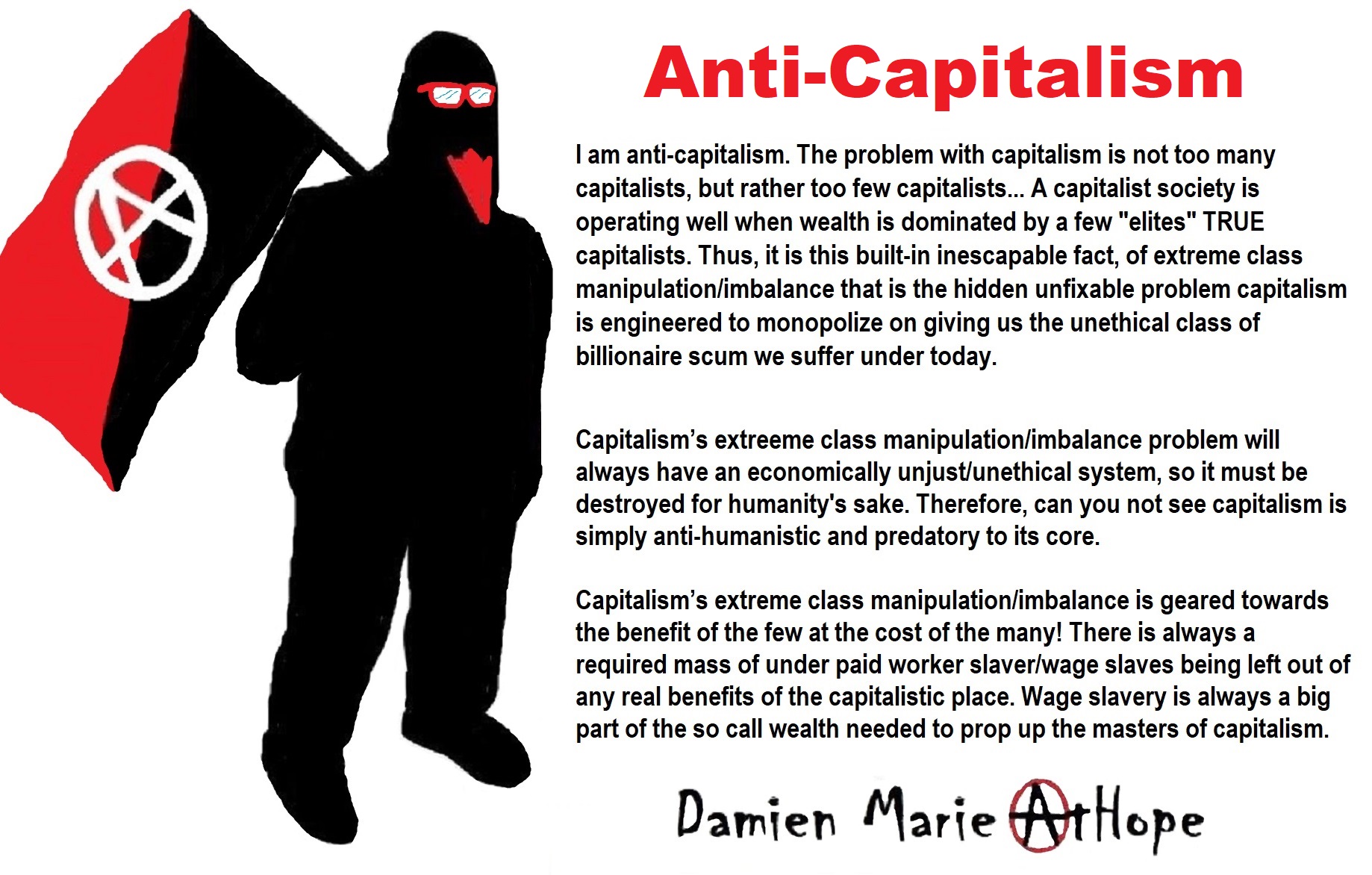

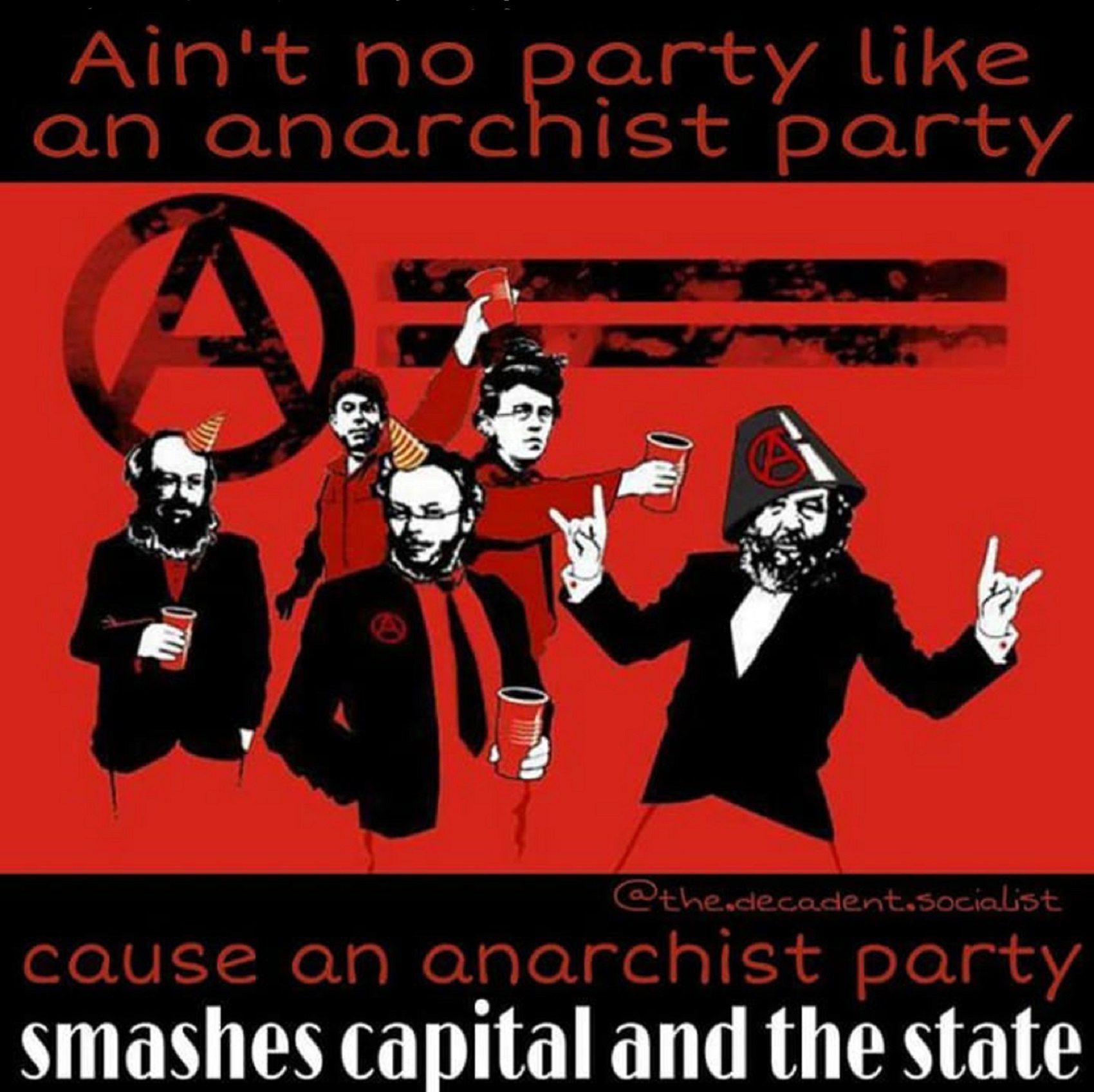
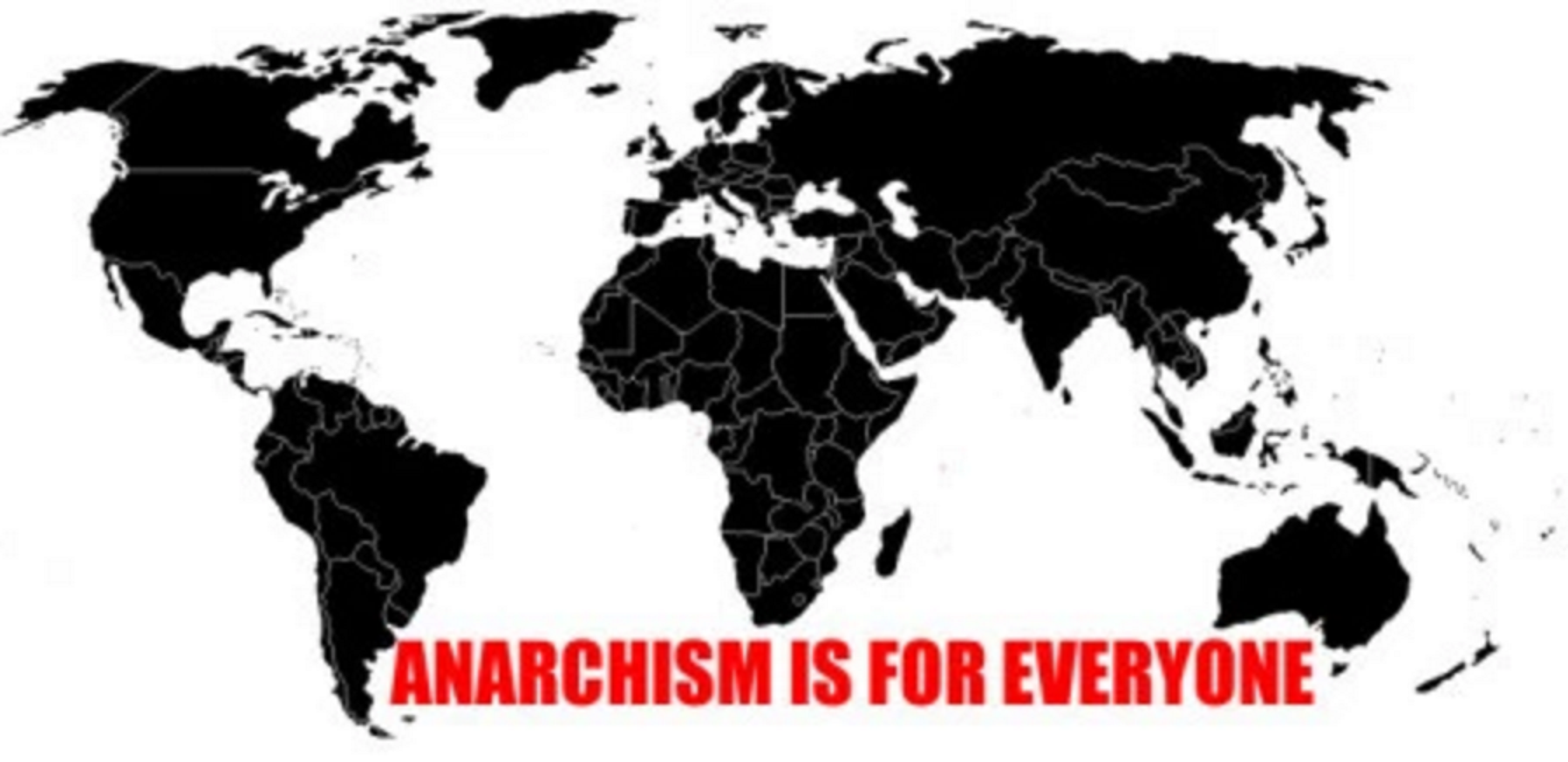
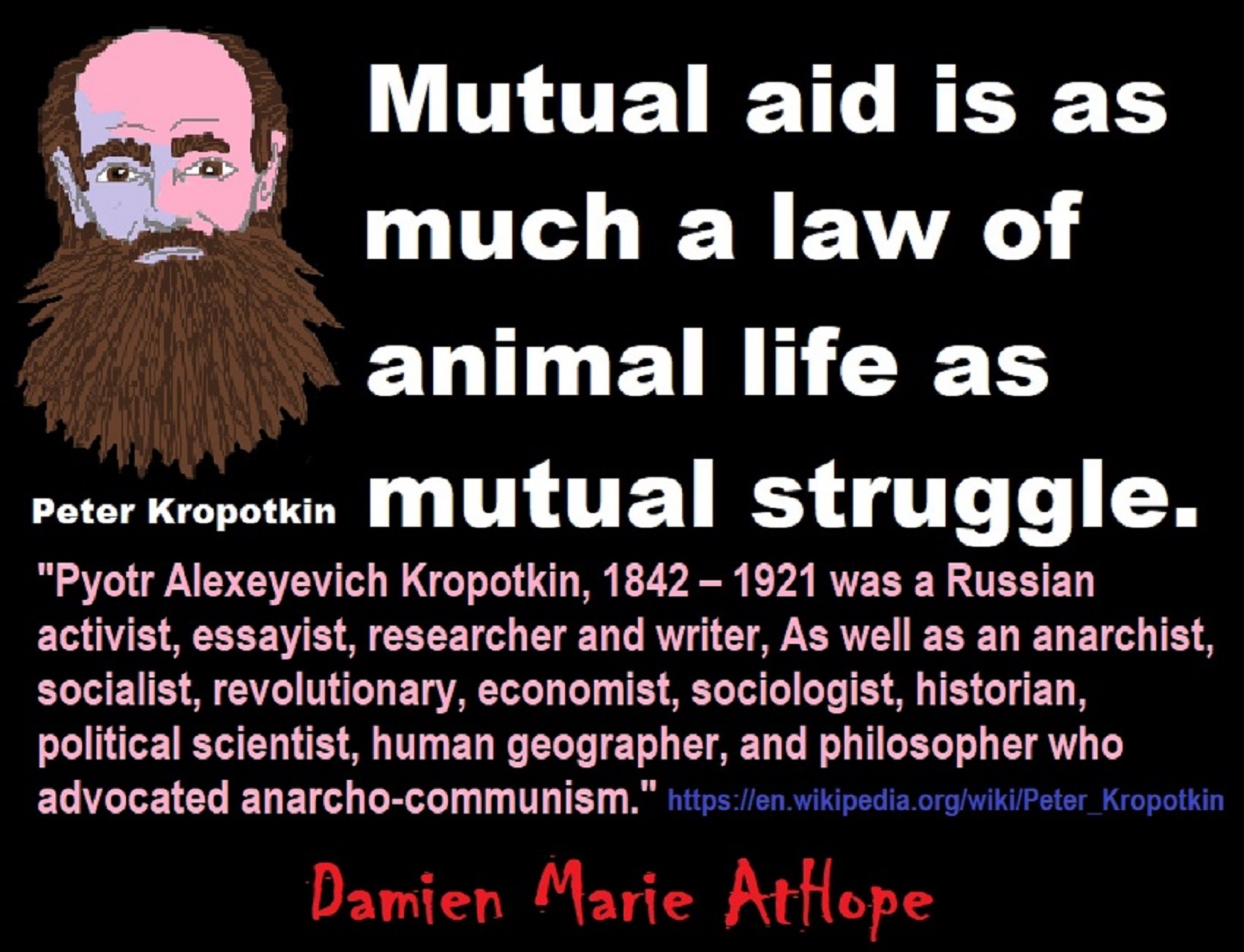


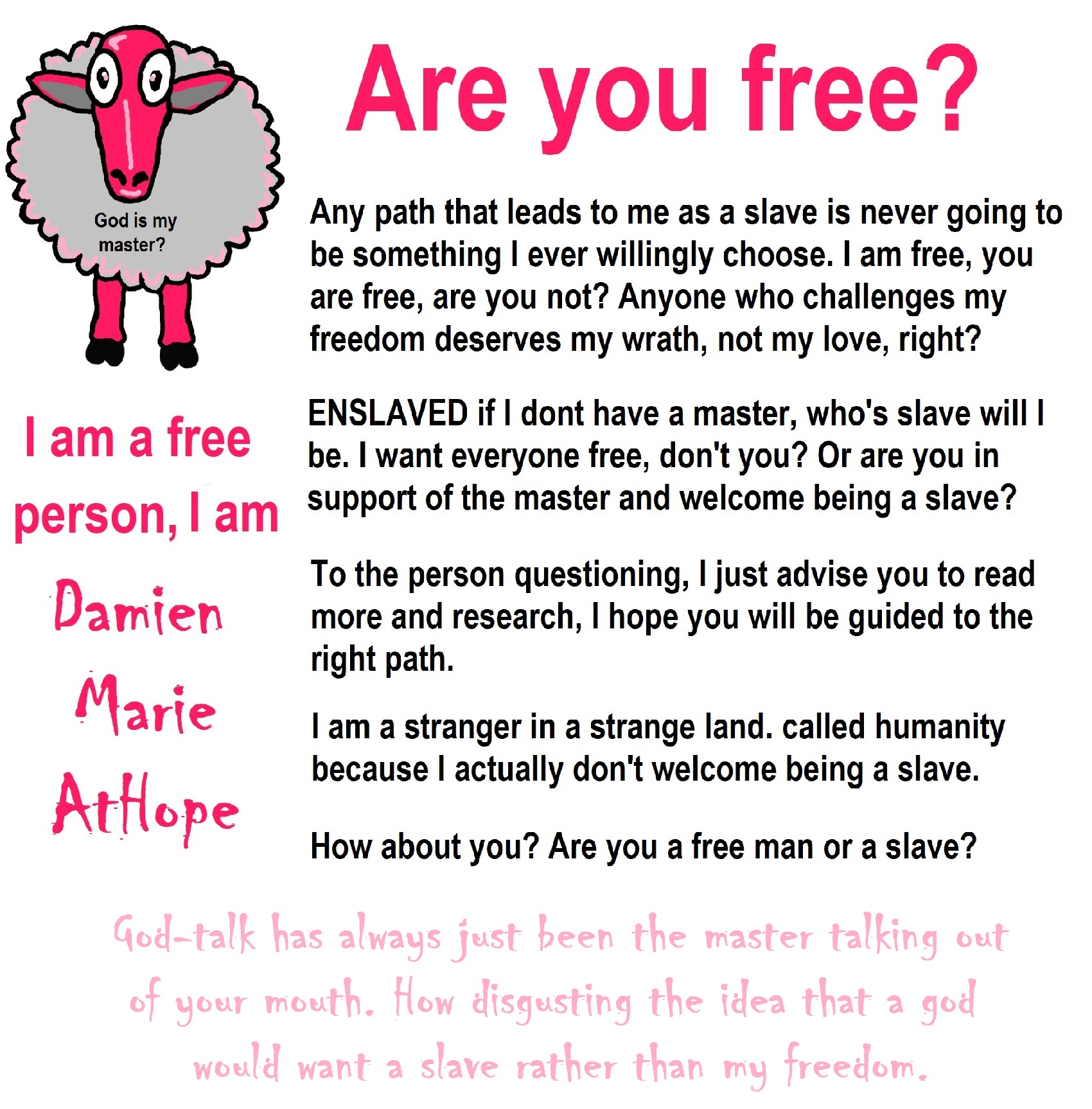
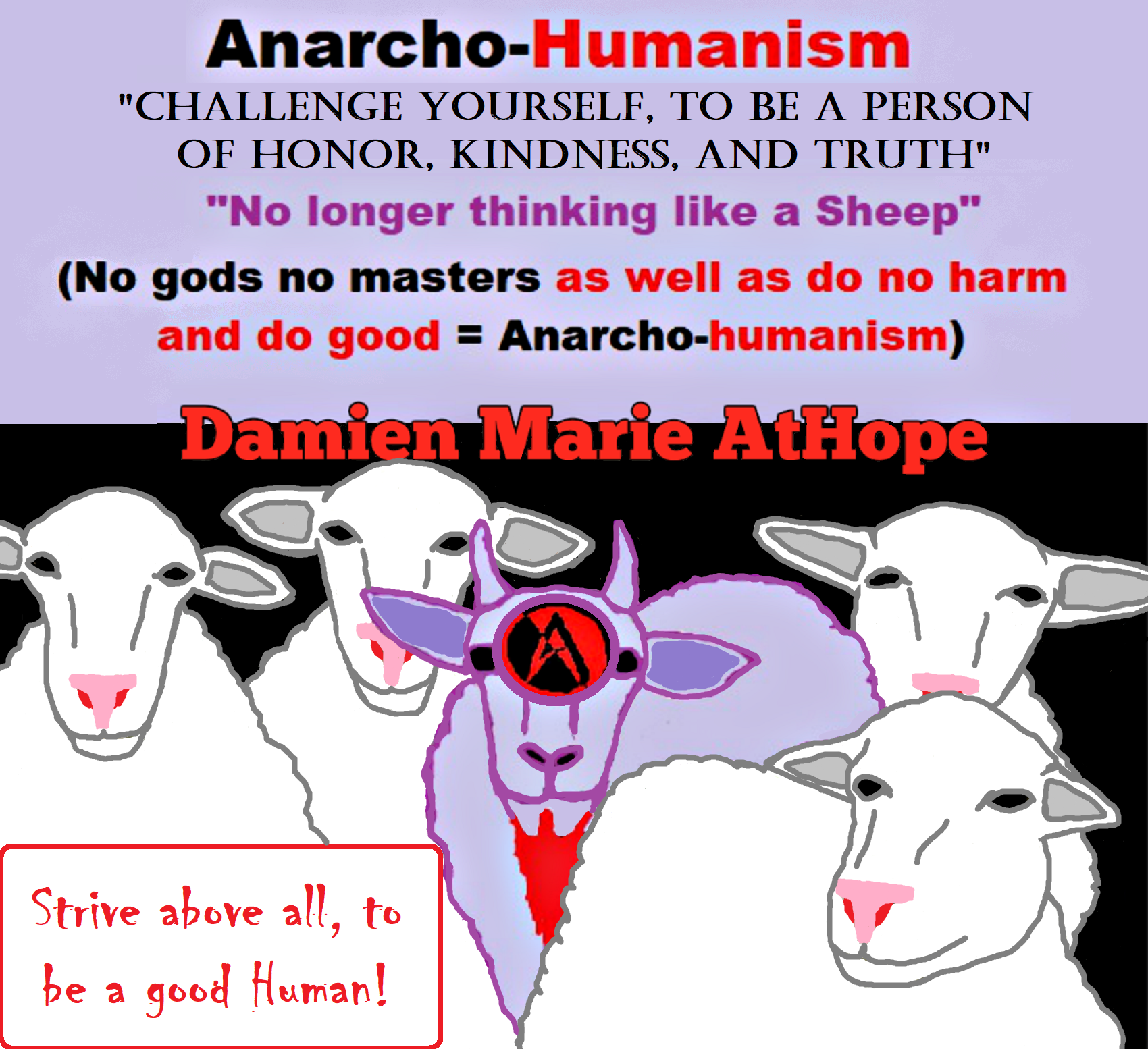
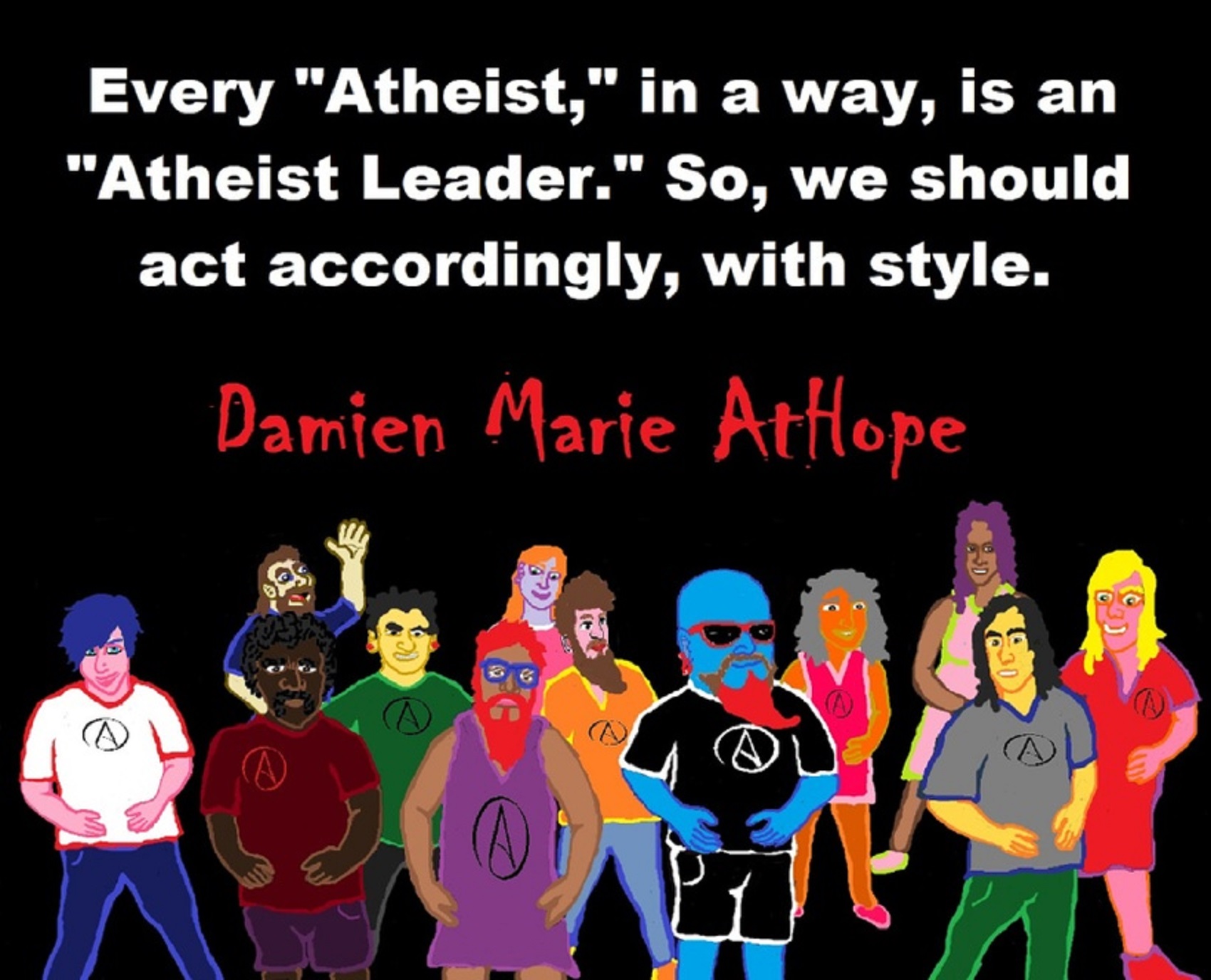


While hallucinogens are associated with shamanism, it is alcohol that is associated with paganism.
The Atheist-Humanist-Leftist Revolutionaries Shows in the prehistory series:
Show two: Pre-animism 300,000 years old and animism 100,000 years old: related to “Anarchism and Socialism”
Show tree: Totemism 50,000 years old: related to “Anarchism and Socialism”
Show four: Shamanism 30,000 years old: related to “Anarchism and Socialism”
Show five: Paganism 12,000 years old: related to “Anarchism and Socialism”
Show six: Emergence of hierarchy, sexism, slavery, and the new male god dominance: Paganism 7,000-5,000 years old: related to “Anarchism and Socialism” (Capitalism) (World War 0) Elite and their slaves!
Prehistory: related to “Anarchism and Socialism” the division of labor, power, rights, and recourses: VIDEO
Pre-animism 300,000 years old and animism 100,000 years old: related to “Anarchism and Socialism”: VIDEO
Totemism 50,000 years old: related to “Anarchism and Socialism”: VIDEO
Shamanism 30,000 years old: related to “Anarchism and Socialism”: VIDEO
Paganism 12,000 years old: related to “Anarchism and Socialism” (Pre-Capitalism): VIDEO
Paganism 7,000-5,000 years old: related to “Anarchism and Socialism” (Capitalism) (World War 0) Elite and their slaves: VIEDO
Paganism 5,000 years old: progressed organized religion and the state: related to “Anarchism and Socialism” (Kings and the Rise of the State): VIEDO
Paganism 4,000 years old: related to “Anarchism and Socialism” (First Moralistic gods, then the Origin time of Monotheism): VIEDO
I do not hate simply because I challenge and expose myths or lies any more than others being thought of as loving simply because of the protection and hiding from challenge their favored myths or lies.
The truth is best championed in the sunlight of challenge.
An archaeologist once said to me “Damien religion and culture are very different”
My response, So are you saying that was always that way, such as would you say Native Americans’ cultures are separate from their religions? And do you think it always was the way you believe?
I had said that religion was a cultural product. That is still how I see it and there are other archaeologists that think close to me as well. Gods too are the myths of cultures that did not understand science or the world around them, seeing magic/supernatural everywhere.
I personally think there is a goddess and not enough evidence to support a male god at Çatalhöyük but if there was both a male and female god and goddess then I know the kind of gods they were like Proto-Indo-European mythology.
This series idea was addressed in, Anarchist Teaching as Free Public Education or Free Education in the Public: VIDEO
Our 12 video series: Organized Oppression: Mesopotamian State Force and the Politics of power (9,000-4,000 years ago), is adapted from: The Complete and Concise History of the Sumerians and Early Bronze Age Mesopotamia (7000-2000 BC): https://www.youtube.com/watch?v=szFjxmY7jQA by “History with Cy“
Show #1: Mesopotamian State Force and the Politics of Power (Samarra, Halaf, Ubaid)
Show #2: Mesopotamian State Force and the Politics of Power
Show #3: Mesopotamian State Force and the Politics of Power (Uruk and the First Cities)
Show #4: Mesopotamian State Force and the Politics of Power (First Kings)
Show #5: Mesopotamian State Force and the Politics of Power (Early Dynastic Period)
Show #6: Mesopotamian State Force and the Politics of Power
Show #7: Mesopotamian State Force and the Politics of Power (Sargon and Akkadian Rule)
Show #9: Mesopotamian State Force and the Politics of Power (Gudea of Lagash and Utu-hegal)
Show #12: Mesopotamian State Force and the Politics of Power (Aftermath and Legacy of Sumer)

The “Atheist-Humanist-Leftist Revolutionaries”
Cory Johnston ☭ Ⓐ Atheist Leftist @Skepticallefty & I (Damien Marie AtHope) @AthopeMarie (my YouTube & related blog) are working jointly in atheist, antitheist, antireligionist, antifascist, anarchist, socialist, and humanist endeavors in our videos together, generally, every other Saturday.
Why Does Power Bring Responsibility?
Think, how often is it the powerless that start wars, oppress others, or commit genocide? So, I guess the question is to us all, to ask, how can power not carry responsibility in a humanity concept? I know I see the deep ethical responsibility that if there is power their must be a humanistic responsibility of ethical and empathic stewardship of that power. Will I be brave enough to be kind? Will I possess enough courage to be compassionate? Will my valor reach its height of empathy? I as everyone, earns our justified respect by our actions, that are good, ethical, just, protecting, and kind. Do I have enough self-respect to put my love for humanity’s flushing, over being brought down by some of its bad actors? May we all be the ones doing good actions in the world, to help human flourishing.
I create the world I want to live in, striving for flourishing. Which is not a place but a positive potential involvement and promotion; a life of humanist goal precision. To master oneself, also means mastering positive prosocial behaviors needed for human flourishing. I may have lost a god myth as an atheist, but I am happy to tell you, my friend, it is exactly because of that, leaving the mental terrorizer, god belief, that I truly regained my connected ethical as well as kind humanity.
Cory and I will talk about prehistory and theism, addressing the relevance to atheism, anarchism, and socialism.
At the same time as the rise of the male god, 7,000 years ago, there was also the very time there was the rise of violence, war, and clans to kingdoms, then empires, then states. It is all connected back to 7,000 years ago, and it moved across the world.
Cory Johnston: https://damienmarieathope.com/2021/04/cory-johnston-mind-of-a-skeptical-leftist/?v=32aec8db952d
The Mind of a Skeptical Leftist (YouTube)
Cory Johnston: Mind of a Skeptical Leftist @Skepticallefty
The Mind of a Skeptical Leftist By Cory Johnston: “Promoting critical thinking, social justice, and left-wing politics by covering current events and talking to a variety of people. Cory Johnston has been thoughtfully talking to people and attempting to promote critical thinking, social justice, and left-wing politics.” http://anchor.fm/skepticalleft
Cory needs our support. We rise by helping each other.
Cory Johnston ☭ Ⓐ @Skepticallefty Evidence-based atheist leftist (he/him) Producer, host, and co-host of 4 podcasts @skeptarchy @skpoliticspod and @AthopeMarie
Damien Marie AtHope (“At Hope”) Axiological Atheist, Anti-theist, Anti-religionist, Secular Humanist. Rationalist, Writer, Artist, Poet, Philosopher, Advocate, Activist, Psychology, and Armchair Archaeology/Anthropology/Historian.
Damien is interested in: Freedom, Liberty, Justice, Equality, Ethics, Humanism, Science, Atheism, Antiteism, Antireligionism, Ignosticism, Left-Libertarianism, Anarchism, Socialism, Mutualism, Axiology, Metaphysics, LGBTQI, Philosophy, Advocacy, Activism, Mental Health, Psychology, Archaeology, Social Work, Sexual Rights, Marriage Rights, Woman’s Rights, Gender Rights, Child Rights, Secular Rights, Race Equality, Ageism/Disability Equality, Etc. And a far-leftist, “Anarcho-Humanist.”
I am not a good fit in the atheist movement that is mostly pro-capitalist, I am anti-capitalist. Mostly pro-skeptic, I am a rationalist not valuing skepticism. Mostly pro-agnostic, I am anti-agnostic. Mostly limited to anti-Abrahamic religions, I am an anti-religionist.
To me, the “male god” seems to have either emerged or become prominent around 7,000 years ago, whereas the now favored monotheism “male god” is more like 4,000 years ago or so. To me, the “female goddess” seems to have either emerged or become prominent around 11,000-10,000 years ago or so, losing the majority of its once prominence around 2,000 years ago due largely to the now favored monotheism “male god” that grow in prominence after 4,000 years ago or so.
My Thought on the Evolution of Gods?
Animal protector deities from old totems/spirit animal beliefs come first to me, 13,000/12,000 years ago, then women as deities 11,000/10,000 years ago, then male gods around 7,000/8,000 years ago. Moralistic gods around 5,000/4,000 years ago, and monotheistic gods around 4,000/3,000 years ago.
To me, animal gods were likely first related to totemism animals around 13,000 to 12,000 years ago or older. Female as goddesses was next to me, 11,000 to 10,000 years ago or so with the emergence of agriculture. Then male gods come about 8,000 to 7,000 years ago with clan wars. Many monotheism-themed religions started in henotheism, emerging out of polytheism/paganism.
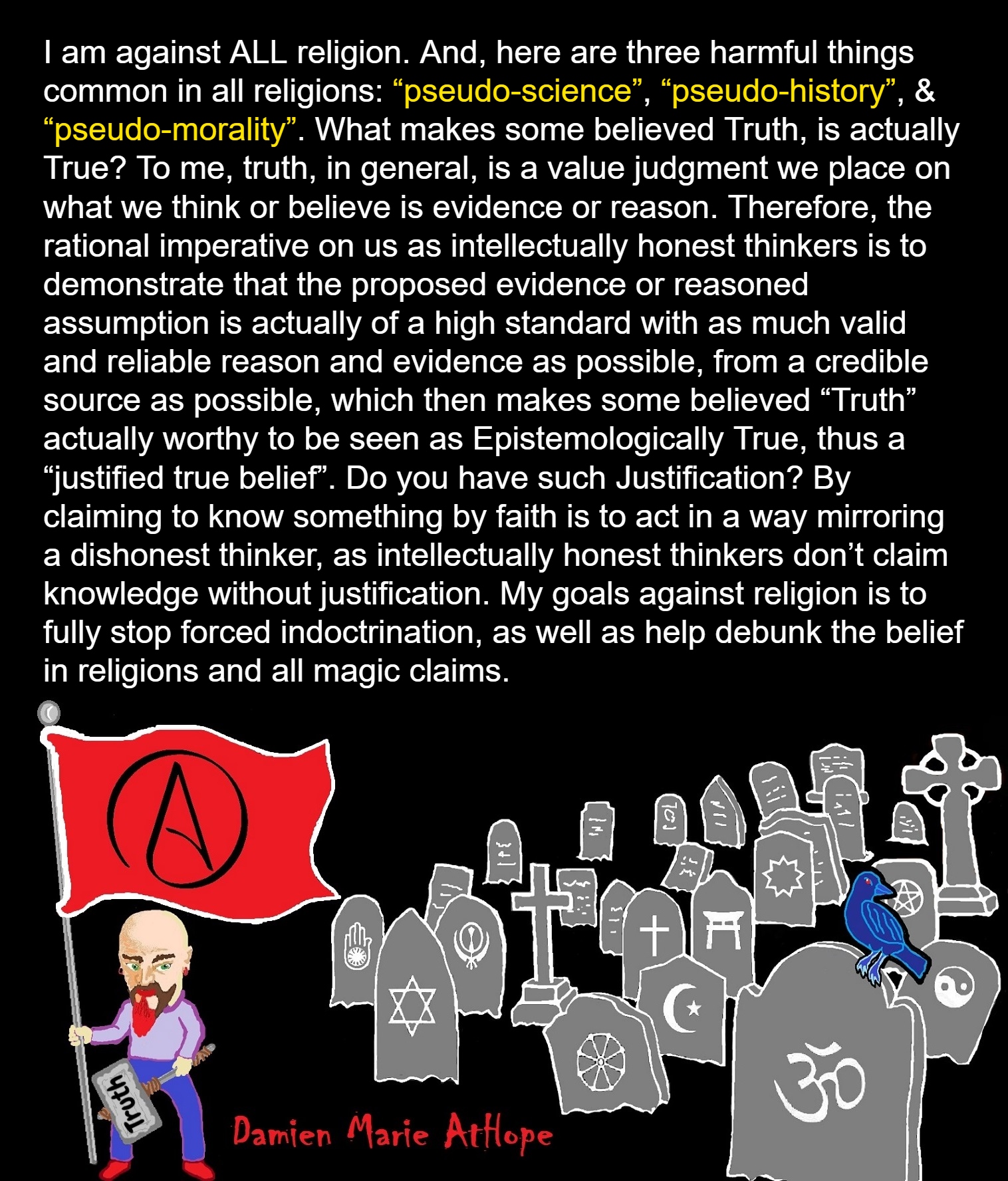

Damien Marie AtHope (Said as “At” “Hope”)/(Autodidact Polymath but not good at math):
Axiological Atheist, Anti-theist, Anti-religionist, Secular Humanist, Rationalist, Writer, Artist, Jeweler, Poet, “autodidact” Philosopher, schooled in Psychology, and “autodidact” Armchair Archaeology/Anthropology/Pre-Historian (Knowledgeable in the range of: 1 million to 5,000/4,000 years ago). I am an anarchist socialist politically. Reasons for or Types of Atheism
My Website, My Blog, & Short-writing or Quotes, My YouTube, Twitter: @AthopeMarie, and My Email: damien.marie.athope@gmail.com

